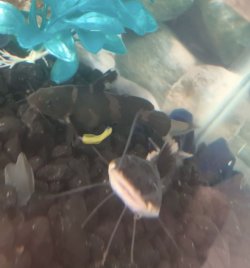Thanks for your response! To be honest, I feel bad I bought the fish from a fish store without researching how big it would grow. Now I’m looking for options for when it gets bigger because unfortunately I won’t be able to keep it I don’t have space for it

BTW my catfish’s stomach grew even more...I hope it’s not ill
Unfortunately, there are not any options for what to do with it when it gets larger, because there are very few places or people that are able and willing to house a fish that gets this large:
We're not kidding, this fish is a river monster. Most public aquariums have more of these than they want already, since so many people buy these when they're small and cute, not giving a thought to what they'll do when it gets bigger.
The absolute best thing you can do is return it to the store you bought it from. You were trying to buy aquarium fish, he sold you a river monster that no reasonable person can house. Make it the stores problem for passing these fish into the hobby and not caring about the impact this has. You can make a solid argument that they didn't fully inform you of what this fish entails, and that it isn't fit for purpose - it certainly isn't fit for purpose as an aquarium fish, as you can see.
It's very possible that if you wait until the fish is larger, you're going to be stuck with it and not find anyone or anywhere willing to take it. It was probably in a tank with a bunch of other baby red tailed cats when you bought it, right? Don't forget that everyone who bought one of those babies is going to be doing the same thing, looking for someone, anyone, who will take it. Or keeping them in tanks that are far too small until they die from stunting, after eating every other fish you own.
If you're in the US, I'd suggest contacting Ohio Fish Rescue. They're the only fish rescue I know of that takes giant monster fish like RTCs, and might be able to give you advice. Always, always research a fish before you buy it. Adult size, tank requirements at adult size, water parameters and temperature etc, what other fish it can live with...
But whatever you do, please never, ever, release anything from your tanks into the wild. Hobbyists have devastated natural ecosystems by releasing fish like these into the wild. They introduce disease pathogens that the wild fish have no immunity to, eat and out compete native fish, and cause a massive impact that can't be fixed.
Just take a look at this video of how plecos (non-native) have been dumped in a state park in Florida, utterly taking over and destroying the ecosystem. Seeing it for yourself brings it home:
Better to euthanise a fish than to release it into the wild, and ignoring all the native fish it will kill.
If you decide to build an outdoor pond for it, make sure it's built in a way that it can't be flooded out and thereby release the fish into local river systems.
 ? Can these two even mate?? Or is my fish bloated for some reason?
? Can these two even mate?? Or is my fish bloated for some reason?  ? Can these two even mate?? Or is my fish bloated for some reason?
? Can these two even mate?? Or is my fish bloated for some reason? 





